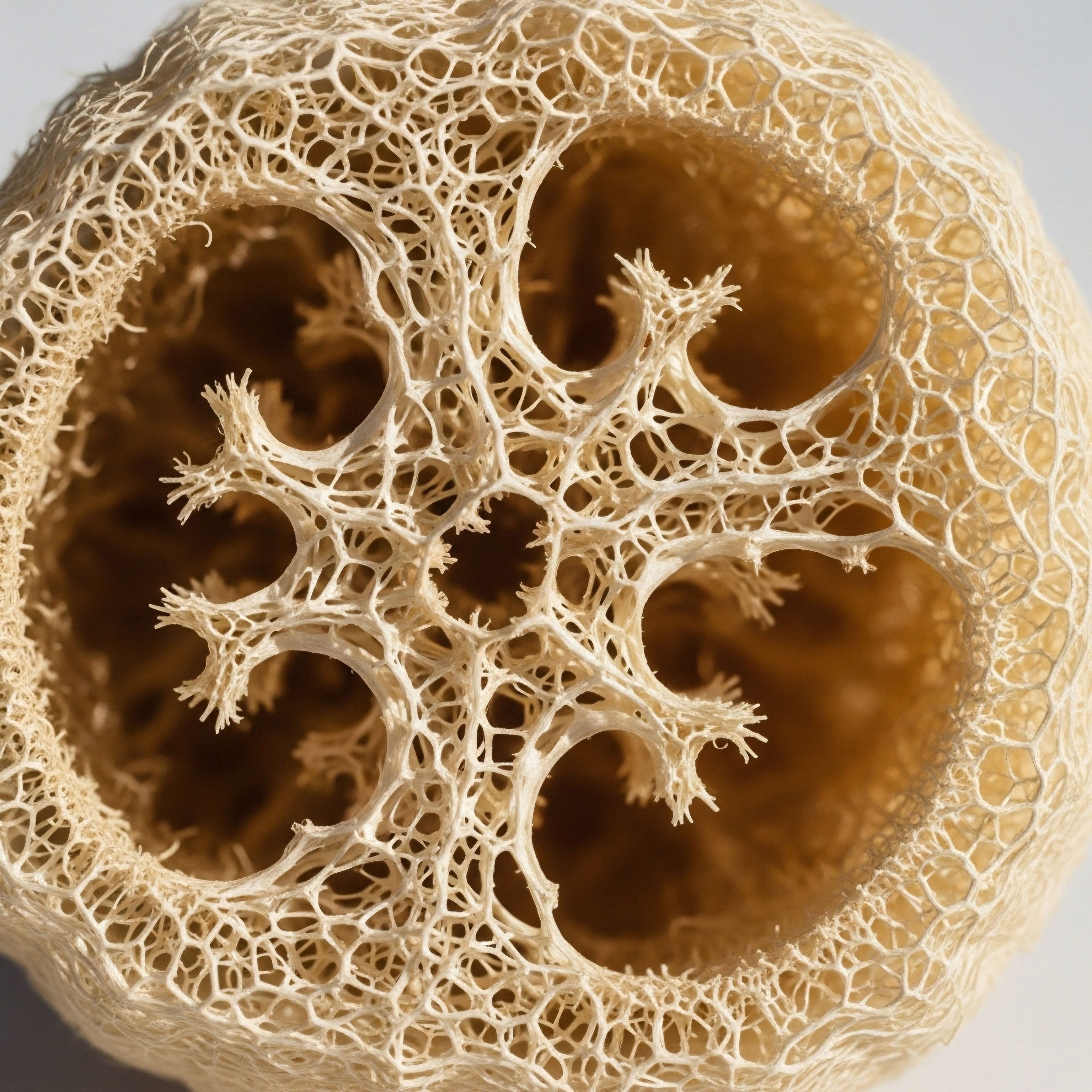

Fundamentals
Many individuals experience moments where their thoughts feel less sharp, their focus wavers, or a general cognitive haze descends, making even routine tasks seem arduous. This sensation, often dismissed as simply “getting older” or “stress,” frequently carries a deeper biological message. It speaks to the intricate, often silent, symphony of the body’s internal messaging system ∞ hormones.
Your personal experience of a mind that feels less vibrant is a valid signal, one that warrants a closer examination of the underlying biochemical processes governing your vitality. Understanding these internal communications offers a path to reclaiming cognitive precision and overall well-being.
Testosterone, a steroid hormone present in both men and women, extends its influence far beyond its commonly perceived roles in muscle mass or libido. Within the brain, specific receptors for testosterone are widely distributed, particularly in regions vital for memory, spatial cognition, and executive function.
When the levels of this biochemical messenger are suboptimal, the impact can ripple through neural pathways, contributing to the very cognitive shifts many people report. This is not a simple deficiency; it represents a systemic imbalance affecting the brain’s operational efficiency.

The Endocrine System a Biological Network
The endocrine system functions as a complex network of glands and organs that produce and release hormones directly into the bloodstream. These hormones act as chemical signals, traveling to target cells and tissues throughout the body, orchestrating a vast array of physiological processes. Consider it a sophisticated internal communication grid, where each hormone carries specific instructions to maintain balance and function. When one part of this grid experiences a disruption, the effects can cascade, influencing seemingly unrelated systems.
The brain, a highly metabolically active organ, relies heavily on this hormonal communication for optimal performance. Hormones influence neurotransmitter synthesis, neuronal growth, and synaptic plasticity ∞ the brain’s ability to reorganize itself and form new connections. A consistent supply of appropriate hormonal signals is essential for maintaining cognitive agility and emotional stability.
The endocrine system acts as the body’s internal communication network, with hormones serving as vital messengers for cognitive and physical well-being.

Testosterone’s Direct Influence on Brain Function
Testosterone directly affects brain cells, particularly neurons and glial cells. It modulates the activity of various neurotransmitter systems, including dopamine, serotonin, and acetylcholine, all of which are critical for mood regulation, motivation, and cognitive processing. For instance, adequate testosterone levels are associated with healthy dopamine pathways, which play a central role in reward, pleasure, and executive functions like planning and decision-making. A decline in testosterone can therefore contribute to a reduction in these cognitive capacities.
Beyond neurotransmitter modulation, testosterone also exhibits neuroprotective properties. It supports the structural integrity of brain cells and may help mitigate age-related cognitive decline. Its presence aids in maintaining the myelin sheath, the protective covering around nerve fibers, which is essential for rapid and efficient neural signal transmission. When this support diminishes, the speed and clarity of thought can be compromised.

Hormonal Feedback Loops
The body maintains hormonal balance through intricate feedback loops. For testosterone, the primary regulatory system involves the Hypothalamic-Pituitary-Gonadal (HPG) axis. The hypothalamus releases Gonadotropin-Releasing Hormone (GnRH), which signals the pituitary gland to produce Luteinizing Hormone (LH) and Follicle-Stimulating Hormone (FSH).
These gonadotropins then stimulate the testes in men and ovaries in women to produce testosterone and other sex hormones. As testosterone levels rise, they signal back to the hypothalamus and pituitary, reducing GnRH, LH, and FSH production, thus completing the loop. This self-regulating mechanism ensures levels remain within a healthy range.
Disruptions to this delicate feedback system, whether due to aging, stress, or other physiological factors, can lead to hormonal imbalances. When the HPG axis is not functioning optimally, the downstream production of testosterone can falter, initiating a cascade of effects that extend to cognitive function. Recognizing these interconnected systems is the first step toward understanding how to restore balance and improve mental clarity.


Intermediate
Understanding the foundational role of testosterone in cognitive function naturally leads to questions about how to address imbalances. Personalized wellness protocols aim to recalibrate the endocrine system, moving beyond a singular focus on testosterone to consider its interactions with other vital hormones. These interventions are not merely about supplementing a deficiency; they represent a strategic biochemical recalibration designed to restore systemic balance and enhance overall vitality, including mental sharpness.

Testosterone Replacement Therapy for Men
For men experiencing symptoms of low testosterone, often termed hypogonadism or andropause, Testosterone Replacement Therapy (TRT) can be a transformative intervention. The standard protocol frequently involves weekly intramuscular injections of Testosterone Cypionate (200mg/ml). This method provides a consistent supply of exogenous testosterone, aiming to restore physiological levels. However, a comprehensive approach recognizes that introducing external testosterone can suppress the body’s natural production and potentially increase estrogen levels.
To mitigate these effects and maintain a more physiological balance, TRT protocols often include additional medications. Gonadorelin, administered via subcutaneous injections twice weekly, stimulates the pituitary gland to continue producing LH and FSH, thereby preserving testicular function and natural testosterone synthesis. This helps prevent testicular atrophy and supports fertility, which is a significant concern for many men considering TRT.
Another critical component is Anastrozole, an aromatase inhibitor, typically taken as an oral tablet twice weekly. Testosterone can convert into estrogen through the enzyme aromatase. While some estrogen is necessary for men’s health, excessive levels can lead to undesirable side effects such as gynecomastia, water retention, and mood disturbances, which can further impair mental clarity.
Anastrozole helps manage this conversion, maintaining a healthy testosterone-to-estrogen ratio. In some cases, Enclomiphene may be incorporated to specifically support LH and FSH levels, offering another avenue for maintaining endogenous production.
Comprehensive male TRT protocols balance exogenous testosterone with agents like Gonadorelin and Anastrozole to maintain natural production and manage estrogen levels.

Hormonal Balance for Women
Women also experience significant cognitive shifts related to hormonal fluctuations, particularly during peri-menopause and post-menopause. While testosterone levels are naturally lower in women, they are equally vital for cognitive function, mood, and libido. Protocols for women are carefully tailored to their unique endocrine landscape.
Testosterone Cypionate is typically administered in much smaller doses for women, often 10 ∞ 20 units (0.1 ∞ 0.2ml) weekly via subcutaneous injection. This low-dose approach aims to restore physiological levels without inducing masculinizing side effects. The goal is to support brain function, energy, and sexual health.
Progesterone plays a central role in female hormonal balance and is prescribed based on menopausal status. It is crucial for uterine health in pre- and peri-menopausal women and contributes to mood stability and sleep quality, both of which indirectly influence mental clarity.
Some women may also benefit from pellet therapy, which involves the subcutaneous insertion of long-acting testosterone pellets, offering sustained release. When appropriate, Anastrozole may also be used in women to manage estrogen levels, particularly if they are experiencing symptoms related to estrogen dominance or are on higher doses of testosterone.

Growth Hormone Peptide Therapy and Cognitive Support
Beyond sex hormones, other biochemical messengers significantly influence mental acuity. Growth Hormone (GH) and its associated peptides play a role in cellular repair, metabolic regulation, and neurogenesis ∞ the creation of new brain cells. For active adults and athletes seeking anti-aging benefits, muscle gain, fat loss, and improved sleep, targeted peptide therapies can offer substantial support. Improved sleep quality alone can dramatically enhance mental clarity.
Key peptides used in these protocols include:
- Sermorelin ∞ A Growth Hormone-Releasing Hormone (GHRH) analog that stimulates the pituitary to produce more natural GH.
- Ipamorelin / CJC-1295 ∞ These peptides work synergistically to increase GH secretion, leading to improved body composition and cognitive benefits.
- Tesamorelin ∞ Specifically approved for reducing visceral fat, it also shows promise in cognitive enhancement.
- Hexarelin ∞ A potent GH secretagogue that can also improve cardiovascular health.
- MK-677 ∞ An oral GH secretagogue that increases GH and IGF-1 levels, supporting muscle growth, sleep, and cognitive function.
These peptides work by stimulating the body’s own GH production, which can lead to improved cellular repair, better sleep architecture, and enhanced metabolic function, all of which contribute to a sharper mind. The indirect effects on mental clarity through better sleep and reduced inflammation are substantial.

Protocols for Post-TRT or Fertility Stimulation
For men who have discontinued TRT or are actively trying to conceive, a specific protocol is implemented to restore natural testosterone production and fertility. This protocol typically includes:
| Medication | Primary Action | Relevance to Mental Clarity |
|---|---|---|
| Gonadorelin | Stimulates LH/FSH production, supporting natural testosterone. | Restores endogenous hormonal balance, indirectly supporting cognitive function. |
| Tamoxifen | Selective Estrogen Receptor Modulator (SERM), blocks estrogen feedback at pituitary. | Increases LH/FSH, leading to higher natural testosterone; helps manage estrogen. |
| Clomid (Clomiphene Citrate) | SERM, stimulates GnRH release, increasing LH/FSH. | Boosts natural testosterone production, aiding in cognitive recovery post-TRT. |
| Anastrozole (Optional) | Aromatase inhibitor, reduces estrogen conversion. | Manages estrogen levels, preventing potential cognitive fog from high estrogen. |
This multi-agent approach aims to reactivate the HPG axis, allowing the body to resume its own testosterone synthesis, which is crucial for sustained mental clarity and overall well-being. The careful titration of these agents ensures a smooth transition and optimal physiological response.


Academic
The intersection of testosterone levels with other hormones for mental clarity extends into the deep complexities of neuroendocrinology and systems biology. A comprehensive understanding requires moving beyond individual hormone actions to appreciate the dynamic interplay within and between various biological axes. Cognitive function is not merely a product of isolated hormonal concentrations; it is a manifestation of an exquisitely balanced endocrine orchestra, where each section influences the others.

Neurosteroidogenesis and Brain Function
Testosterone, along with its metabolites estradiol and dihydrotestosterone (DHT), functions as a neurosteroid. This means these hormones are not only produced by gonads but also synthesized de novo within the brain itself by neurons and glial cells, a process termed neurosteroidogenesis. This local production allows for precise, localized modulation of neural activity, independent of systemic circulating levels. Brain regions such as the hippocampus, prefrontal cortex, and amygdala, all critical for memory, executive function, and emotional regulation, exhibit robust neurosteroidogenic capacity.
The enzymes involved in testosterone synthesis and metabolism, such as 5-alpha reductase (converting testosterone to DHT) and aromatase (converting testosterone to estradiol), are highly expressed in these brain areas. The local concentrations of DHT and estradiol, derived from testosterone, exert distinct effects on neuronal excitability, synaptic plasticity, and neurogenesis.
For instance, estradiol, even in the male brain, plays a significant role in memory consolidation and protection against neurodegenerative processes. Understanding this localized synthesis and action reveals a deeper layer of complexity in how testosterone influences cognitive performance.
Neurosteroidogenesis highlights the brain’s capacity to locally synthesize hormones like testosterone and its metabolites, directly influencing neural function.

Interactions with the Hypothalamic-Pituitary-Adrenal Axis
Mental clarity is profoundly affected by stress, and the primary mediator of the stress response is the Hypothalamic-Pituitary-Adrenal (HPA) axis. This axis releases cortisol, the body’s main stress hormone. A chronic activation of the HPA axis, leading to sustained elevated cortisol levels, can directly impair cognitive function, particularly in areas of memory and executive control. The HPG and HPA axes are not isolated; they exhibit significant cross-talk.
Elevated cortisol can suppress GnRH release from the hypothalamus, thereby inhibiting LH and FSH production and subsequently reducing testosterone synthesis. This phenomenon, often observed during periods of chronic psychological or physiological stress, creates a vicious cycle where stress-induced low testosterone further compromises cognitive resilience. Conversely, optimal testosterone levels may help buffer the negative cognitive effects of stress by modulating HPA axis activity and enhancing neuroplasticity. The balance between these two major axes is paramount for maintaining cognitive equilibrium.

Thyroid Hormones and Neurotransmitter Modulation
The thyroid gland, regulated by the Hypothalamic-Pituitary-Thyroid (HPT) axis, produces thyroid hormones (T3 and T4) that are absolutely essential for brain development and function across the lifespan. Hypothyroidism, even subclinical, is a recognized cause of cognitive impairment, including slowed thinking, poor concentration, and memory deficits. Thyroid hormones influence neurotransmitter systems, including serotonin and norepinephrine, which are critical for mood, attention, and overall cognitive processing.
The interplay between testosterone and thyroid hormones is indirect but significant. Both contribute to overall metabolic health and energy production, which are foundational for brain function. Dysregulation in one system can place additional strain on the other. For example, individuals with low testosterone may also exhibit subtle thyroid dysregulation, compounding cognitive symptoms. A holistic assessment of hormonal status must therefore include a thorough evaluation of thyroid function to fully address mental clarity concerns.

The Role of Insulin Sensitivity and Metabolic Health
Metabolic health, particularly insulin sensitivity, holds a direct bearing on cognitive function and is intimately linked with hormonal balance. Insulin, a hormone produced by the pancreas, regulates blood glucose levels and plays a vital role in brain energy metabolism. Insulin resistance, a condition where cells become less responsive to insulin, is associated with cognitive decline, impaired memory, and an increased risk of neurodegenerative conditions.
Testosterone influences insulin sensitivity. Lower testosterone levels in men are often correlated with increased insulin resistance and a higher prevalence of metabolic syndrome. This connection suggests a bidirectional relationship ∞ poor metabolic health can negatively impact testosterone production, and low testosterone can exacerbate metabolic dysfunction.
| Hormone/Axis | Primary Cognitive Impact | Interconnection with Testosterone |
|---|---|---|
| Neurosteroids (Brain-derived T, DHT, Estradiol) | Local modulation of neural excitability, synaptic plasticity, neurogenesis. | Testosterone serves as a precursor for brain-derived DHT and estradiol, influencing localized brain function. |
| HPA Axis (Cortisol) | Stress response, memory impairment, executive function deficits. | Chronic cortisol elevation suppresses HPG axis, reducing testosterone; optimal testosterone may buffer stress effects. |
| HPT Axis (Thyroid Hormones) | Overall brain metabolism, neurotransmitter synthesis, attention, mood. | Indirectly, both contribute to metabolic health; thyroid dysfunction can compound cognitive issues in low testosterone states. |
| Insulin | Brain energy metabolism, memory, cognitive function. | Low testosterone correlates with insulin resistance; optimizing testosterone can improve metabolic health and cognitive energy. |
Optimizing testosterone levels, therefore, is not just about addressing a single hormone; it is about restoring a broader metabolic and endocrine equilibrium that supports robust brain function. The intricate web of interactions between testosterone, neurosteroids, stress hormones, thyroid hormones, and insulin sensitivity collectively dictates the landscape of mental clarity. Addressing these systems in concert provides a comprehensive strategy for cognitive enhancement and sustained well-being.

How Does Neurotransmitter Balance Affect Cognitive Acuity?
The brain’s ability to process information, maintain focus, and regulate mood relies on a delicate balance of neurotransmitters. Testosterone and its metabolites directly influence the synthesis, release, and receptor sensitivity of several key neurotransmitters. For instance, testosterone is known to modulate the dopaminergic system, which is central to motivation, reward, and executive functions.
A decline in testosterone can lead to reduced dopamine activity, manifesting as apathy, decreased drive, and difficulty with task initiation ∞ all contributing to a perceived lack of mental clarity.
Similarly, testosterone impacts the serotonergic system, which plays a crucial role in mood regulation, sleep, and anxiety. Imbalances in serotonin are linked to depressive symptoms and cognitive fogginess. By influencing these fundamental neurochemical pathways, testosterone exerts a profound, yet often underestimated, effect on the brain’s operational efficiency and an individual’s subjective experience of cognitive sharpness.

Can Hormonal Optimization Protocols Improve Brain Plasticity?
Brain plasticity, or neuroplasticity, refers to the brain’s remarkable ability to reorganize itself by forming new neural connections throughout life. This capacity is fundamental for learning, memory, and adaptation. Hormones, including testosterone, play a significant role in supporting neuroplasticity. Testosterone has been shown to promote the growth of dendrites, the branching extensions of neurons that receive signals, and to enhance synaptic strength.
Growth hormone and its associated peptides, as discussed previously, also contribute to neurogenesis in areas like the hippocampus, a region vital for memory formation. By supporting these processes, hormonal optimization protocols aim to not only restore existing cognitive function but also to enhance the brain’s inherent capacity for adaptation and resilience. This goes beyond simply alleviating symptoms; it targets the underlying biological mechanisms that support a vibrant and adaptable mind.

References
- Balthazart, Jacques, and Gregory F. Ball. “Brain aromatase and the regulation of male sexual behavior.” Journal of Neuroendocrinology, vol. 15, no. 11, 2003, pp. 1041-1052.
- McEwen, Bruce S. and Robert M. Sapolsky. “Stress and the brain ∞ Plasticity and neurotoxicity.” Annual Review of Neuroscience, vol. 22, 1999, pp. 105-129.
- Viau, Victor, and Michael J. Meaney. “The neuroendocrinology of stress and adaptation.” Handbook of Neuroendocrinology, edited by George Fink and Donald W. Pfaff, Academic Press, 2012, pp. 1-24.
- Hage, Michel P. and Ziad Z. Azar. “The link between thyroid function and depression.” Journal of Thyroid Research, vol. 2012, 2012, Article ID 590763.
- Craft, Suzanne. “Insulin resistance and Alzheimer’s disease pathogenesis ∞ potential mechanisms and therapeutic implications.” Current Alzheimer Research, vol. 7, no. 1, 2010, pp. 41-50.
- Grossmann, Mathis, and Robert J. McLachlan. “Testosterone and type 2 diabetes in men.” Asian Journal of Andrology, vol. 17, no. 2, 2015, pp. 195-201.
- Hogervorst, Eef, et al. “Testosterone and cognition in men ∞ a review of the evidence.” Psychoneuroendocrinology, vol. 29, no. 7, 2004, pp. 859-879.
- Spritzer, Peter M. et al. “Testosterone and the brain ∞ current views on the neuroendocrine regulation of cognitive function.” Journal of Neuroendocrinology, vol. 27, no. 1, 2015, pp. 1-10.

Reflection
The journey toward reclaiming mental clarity often begins with recognizing that your experiences are not isolated incidents but rather signals from a complex biological system. Understanding how testosterone interacts with other hormones offers a profound lens through which to view your own vitality. This knowledge is not merely academic; it is a powerful tool for introspection, prompting you to consider the intricate balance within your own body.
The information presented here serves as a foundational step, providing a framework for comprehending the interconnectedness of your endocrine health and cognitive function. Your unique biological blueprint necessitates a personalized approach. Consider this exploration an invitation to engage more deeply with your own physiology, recognizing that a path to renewed cognitive sharpness and overall well-being is within reach, guided by precise, evidence-based understanding.



